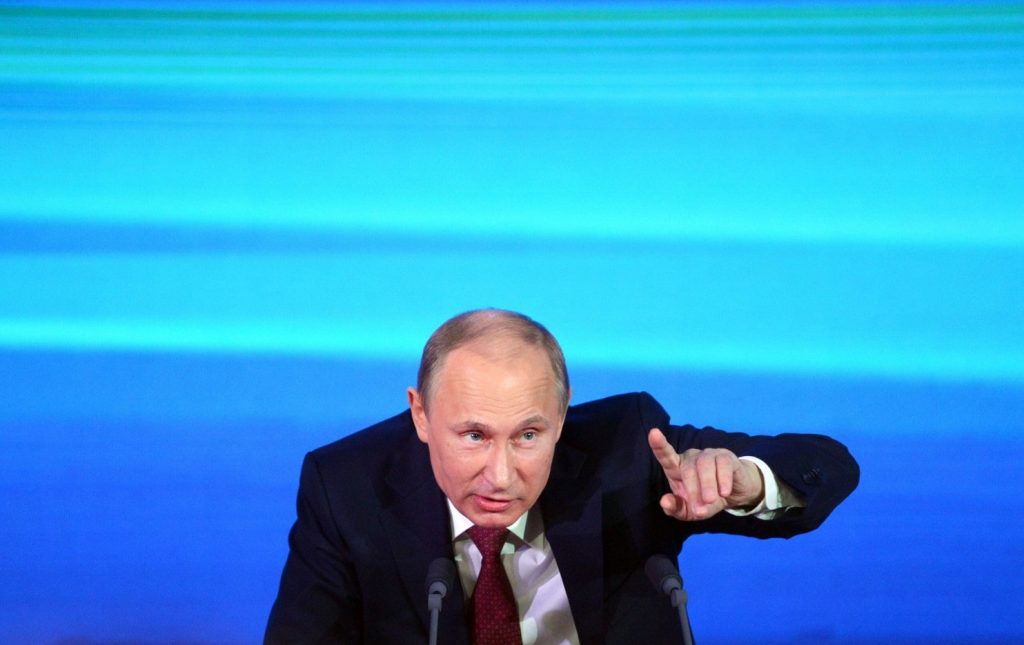BRUSSELS BEHIND THE SCENES
Weekly analysis and untold stories
With SAM MORGAN
Cracking the man of steel
The European Union cannot agree on a Russian fossil fuels import ban, so Vladimir Putin’s illegal and brutal invasion of Ukraine will continue to be funded by coal, gas and oil sales. Brussels has at least used the power it does have to ban another lucrative commodity: steel.
Long before Putin’s soldiers entered Ukraine and began shelling its cities, the EU heralded its home-grown trade policies as a powerful weapon in curbing everything from human rights abuses to climate change.
Access to the EU’s single market and nearly half a billion relatively well-off consumers is a huge carrot, while revoking that privilege is a big stick that all of the EU’s trading partners would like to avoid.
France, for example, wants imports to adhere to strict EU standards as part of its quest to write “mirror clauses” into trade pacts. That faces pushback from countries that are scared third-parties will shift to markets with weaker rules.
The EU does not hold all the cards, after all.
BRUSSELS BEHIND THE SCENES is a weekly newsletter which brings the untold stories about the characters driving the policies affecting our lives. Analysis not found anywhere else, Sam Morgan helps you make sense of what is happening in Brussels. If you want to receive Brussels behind the scenes straight to your inbox every week, subscribe to the newsletter here.
Russia has its own leverage over the bloc: energy imports net hundreds of millions of euros every day and most EU member states are far too dependent on fossil fuels to turn the taps off overnight.
That is why there is little appetite to punish Putin this way. Germany’s government insists that nixing its gas imports would crater GDP and cost thousands of jobs, while election-prepping leaders like Viktor Orban do not want to upset potential voters.
So Brussels has had to look elsewhere for pressure points, as – it bears repeating the fact that the EU has no power to impose bans without member state approval – an energy import embargo is not going to happen anytime soon, even if Russian aggression escalates.
It would take a massive acceleration of the Kremlin’s war tactics, including probably the use of chemical and nuclear weapons, to convince government leaders that a red line has been crossed and Russian gas supplies are no longer tenable.
Plans are in motion to substitute Kremlin hydrocarbons for other supplies and, eventually, alternative energy sources. But the ticking clock drowns out most calls for a complete and immediate fossil fuel phaseout.
This is all presuming that Putin does not cut off the fossil fuel hook-ups unilaterally. Decreased flows have been recorded in some pipelines already but whether that is a warning shot or something more earth-shattering remains to be seen.
Steel does bend
Instead, Brussels has – as well as many other tradable items – decided to curb Russian steel imports. The ban is not a total one: only finished products are included, while raw materials such as slabs are not.
But it is a significant tweak to trade policy given that a fifth of EU imports come from Russia and it is one of the main materials in manufacturing and construction. It will exert even more pressure on the steel market, already constricted thanks to the loss of imports from Ukraine.
The European Commission has attempted to cushion the blow to industry by redistributing Russia’s quotas to other exporting countries. Whether that will lead to a longer-lasting shift in global trade patterns depends on a lot of factors, which are impossible to predict.
Steel is never far from politics. Brussels is also lodging a protest at the WTO about subsidised Chinese steel and last year finally agreed to a freeze of tariff hostilities with Washington.
Russia’s unlawful war on Ukraine could have inadvertently put an early nail in its domestic sector’s coffin, which was already facing an uncertain future thanks to the direction of travel of both the EU’s climate policies and Europe’s industrial strategy.
EU governments this week agreed with the Commission’s plan to deploy a carbon border tax in the near future, which would slap a levy on specific imports that do not meet certain environmental criteria. Steel is one such product.
The carbon border adjustment mechanism or CBAM already prompted Putin to moan that it is not in keeping with World Trade Organisation principles and to warn Russian businesses to start planning for life with it.
Kadri Simson, the EU energy commissioner, is currently in Sweden and has visited a pioneering facility that has started producing ‘green steel’ through a process that utilises renewable energy and no fossil fuel inputs.
The firm behind the venture has decided to retrofit more of its existing furnaces with the green technology and more capacity will be added in the coming months and years. The writing is truly on the wall for dirty construction materials.
Every day, Putin’s reign looks more and more like Josef Stalin’s, one of history’s great monsters whose purges cost thousands of lives and whose legacy the current Russian president has quietly but surely rehabilitated over the last decade.
Pleasingly ironic then, that one of the many small undoings of Putin’s grip on power may turn out to be the very material that lent ‘Uncle Joe’ his man of steel pseudonym.
BRUSSELS BEHIND THE SCENES is a weekly newsletter which brings the untold stories about the characters driving the policies affecting our lives. Analysis not found anywhere else, Sam Morgan helps you make sense of what is happening in Brussels. If you want to receive Brussels behind the scenes straight to your inbox every week, subscribe to the newsletter here.

